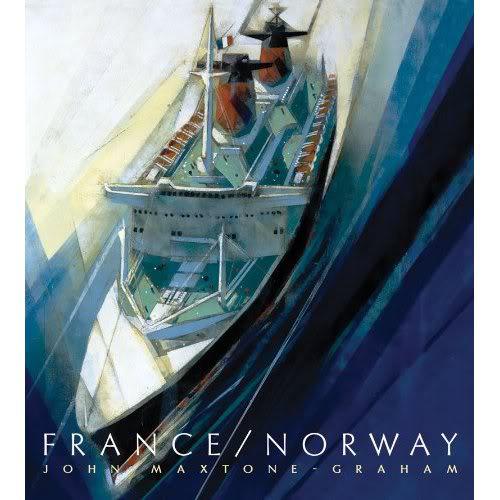



ABP publishes a world exclusive
In 2007 John Maxtone-Graham had offered to the transatlantic liners and maritime world lovers a big and splendid book on the French-Breton liner Normandie (1 and [Lire] ). The same editor, Norton, publishes in New York and London a sum on the steamship France / Norway (2). Under the same format one finds again this iconographic quality one is accustomed to by Norton editions.
In 1972, after a career of manager in Broadway, John Maxtone-Graham signed his first book « The only way to cross » (3) which will be a beautiful bookshop success. Since then he did not cease writing. In his last two books « Queen Mary 2 » and « Normandie », he did not forget Saint-Nazaire which saw the birth of those giants of the seas. In the foreword of his « Queen Mary 2, the greatest ocean liner of our time » John Maxtone-Graham greets the patient work of the skillful hands of those Breton board workers (Breton shipwrights) that gave life to the immortals Paris, Ile de France, Normandie and the third France. (4)
To understand his devotion to the steamships, it should be known that since the age of 6 months, John Maxtone-Graham crossed the Atlantic ocean more than 200 times on liners. It is after the stock market krach of 1929 that he embarked in Boston on the Minnewask heading to Southampton: « My father was a banker in New York. He received fronthead the shock of the stock market krach and my parents left to live in Scotland ». With his wife Mary, he spends about 7 months a year on seas to give lectures about steamers like Queen Mary 2 and to keep in touch with this so particular world of cruising.
In July 2008 he had stopped in Saint-Nazaire for his research about the France. While going back over the tracks of the prestigious steamer, the historian from New York met again his Nazairian friends with whom he has been working for several years (5). In his « From song to Sovereign »(6) book, John Maxtone-Graham names the Penhoët Shipyard: the « Shipyard of Immortals »
The book subtitle : « France's last liner / Norway's first mega cruising steamer » summarizes well the plan of the book with a first part that tells the birth and the life of the France steamer and a second part related to the context of the death of the traditional transatlantic lines, with the development of jet airliner and democratization of cruising which gives a new life to the liner born in Penhoët under the new name of Norway. The epilog tells the decay of the vessel under the name of Blue Lady with her long mortal agony between Bremerhaven and Along.
Before he left Saint-Nazaire, John Maxtone-Grahame declared in 2008 to his Breton friends: « I will put all the Breton soul in my text about the departure of “France” from Saint-Nazaire ». The reading of the contemporary press and testimonies he collected had particularly moved him. He wonderfully restores the atmosphere of that time and the Breton spirit. He is made of the same maritime fiber as the Bretons' he describes at the time of the farewell to France from Saint-Nazaire people: « They were consumed by an almost religious devotion to Brittany no less than to every vessel that bretons hearts and hands had fashionned for over a century. Breton blood is made of salt-water and trace elements of oak, canvas, teak, hemp, brass, steel, iron and bronze » (p. 69).
John Maxtone-Graham is more than a maritime historian, he is an authentic English language stylist. When one reads his impressions on the Breton spirit, one may says to oneself: « What a pity John Maxtone-Graham did not meet Jack Kerouac on a New York avenue or aboard the “France” steamer, on which the “Beat Generation” writer might have travelled – together with the Breton Youenn Gwernig – in 1969, when he came to Brittany and search for his Breton ancestors… ».
In 2008 John told his surprise not to have found a publisher for a French edition of his book on Normandie. Let us hope now that this new issue on France / Norway arouses at last, for a translation in French, the interest of a publisher on this side of the Atlantic, and why not in Brittany!
Hubert Chémereau
Translation Maryvonne Cadiou from [Lire]
Notes
(1) – Normandie: France's legendary Art Deco ocean liner, published by Norton Editions, December 2007, illustrated by W. W. Norton: http://books.wwnorton.com/books/detail.aspx?ID=5941
(2) – France / Norway. France's the last liner / Norway's first mega cruising steamer, Norton editions : http://books.wwnorton.com/books/detail.aspx?ID=17107 , Hardcover
December 2010, ISBN 978-0-393-06903-7, 224 pages, 10.5 × 11.3 inc.
(3) – The Only Way to Cross: The Golden era of the great Atlantic liners - From the Mauretania to the France and the Queen Elizabeth 2 . First published 1972 by MacMillan NY, April 1978 by Macmillan Pub Co, 1983 by Patrick Stephens. http://www.bookbravo.com/week36_03102003.html for a report.
(4) – Queen Mary 2, the greatest ocean liner of our time, Bulfinch Press, 2004. Sprawling Alstom Chantiers de l'Atlantique is the central industrial complex of the town of St-Nazaire, situated where the Loire debouches into the Atlantic. There, for more than a century and a half, an evocative parade of French Line tonnage has been produced. The patient, skilled hands of those Breton shipwrights gave life to immortals such as “Paris, Ile de France, Normandie” and the third “France”.
(5) – From song to Sovereign, [Du chant à la souveraine], by Intl Voyage Media, 1987, 96 p.
(6) - The Research center & Diffusion of the Breton Identity- CREDIB Sant-Nazer narrowly collaborated with the New York historian and brought him new documents and unpublished testimonies on the steamer France, masterpiece of the Breton naval architecture. CREDIB received a book before its official publication due in December and publishes on its website, with the authorization of the author, a part of the book, translated into French by Yvette Daniel, member of Credib. http://credibsantnazer.hautetfort.com/ on November 18th, 2010.
